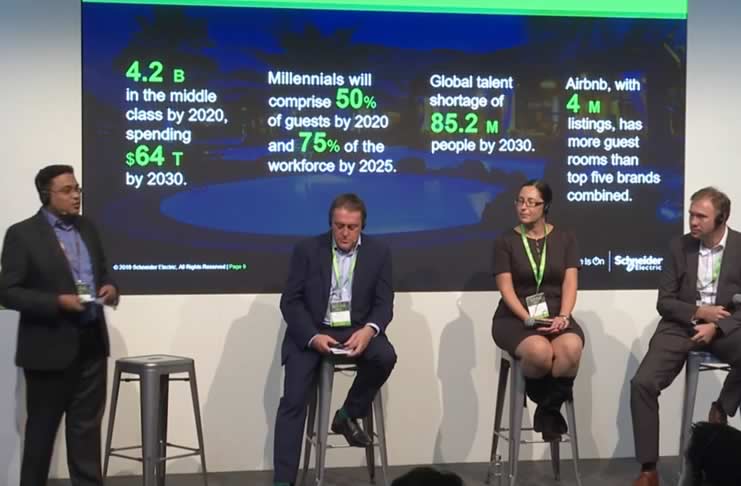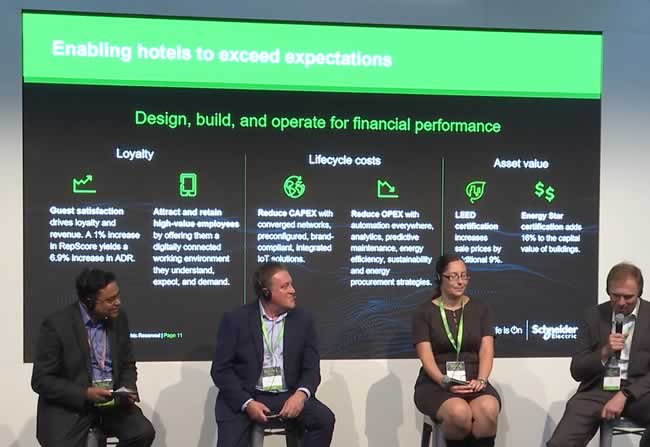The digital transformation of the hotel industry is first and foremost about the guest experience of an increasingly digital guest who expects seamless, connected, and digital experiences.
No wonder that for hotels, technological innovation is a way to have a competitive edge from the guest/customer perspective. There is even somewhat of a race between hotel brands to show their customers they are the first movers in offering the latest relevant technological capabilities to make the guest experience better.
Although the customer experience of the guest takes center stage, the usage of technologies in the hotel industry is also driven by other priorities, which in turn drive the digital hotel investments and the applications/innovations you will see pop up first in hotels – in the rooms and beyond, with IoT and smart sensors as essential enablers.

Digital hotels for higher performance
In an interview on Schneider Electric’s EcoXpert hotel specialization and ecosystem, Shovan Sengupta dives deeper into these and other questions and topics. During the interview, Shovan now and then pointed to an interesting panel debate he hosted at the Innovation Summit Barcelona 2019, ‘Digital hotels for higher performance.’
You can watch the full discussion below. In this article we look at some critical technologies for the hotel industry in the scope of the guest experience, as mentioned by the panelists, and some overall challenges and priorities regarding hotels, from the facility perspective.
Participants at the ‘Digital hotels for higher performance’ expert learning session:
- Shovan Sengupta, who is the Global Vice President, Hotel Segment, at Schneider Electric,
- Paulina Godfrey, Senior Director of Energy and Environment EMEA at Hilton,
- Martin Taylor, Director, Building Services, Meinhardt UK and
- Simon Gill, Associate Director, UKIMEA Hotels & Leisure Business, Arup.
Significant socioeconomic shifts and digital priorities for the hotel industry
Shovan opened the discussion by summarizing some of the essential evolutions in the hospitality and travel industry that, just like other industries, is confronted with several challenges, including the changing expectations of (younger generations of) customers.
On a side note: these shifting demands, among others, also impact the future of retail facilities and healthcare facilities as covered previously. According to experts, they’re also a driver for the coming inflection point in building systems integration. And of course it’s not just about the facilities alone: the mentioned sectors – and others – are impacted by these changes as a whole. Shovan, whom we also interviewed on Schneider Electric’s hotel specialization program under the EcoXpert channel brand, says Millennials will change the ways hotels are designed, built, and operated.
Before summing up some technologies in the hotel industry, which the panelists mentioned, let’s take a quick look at some drivers and priorities.
Shovan and Schneider Electric see four significant evolutions (socioeconomic shifts) with regards to (the drivers of) the direction the hotel industry will take:
- A surge in travel. This surge is partly due to the growing middle class in emerging countries, as the World Tourism Organization (UNWTO) recently reminded ahead of its 2019 General Assembly. Globally, the middle class is expected to reach 5.3 billion people by 2030, with most of the growth in Asia. Shovan pointed to the increasing number of Asians coming over to Europe and the US for their vacation.
- Millennials. Here they are. Obviously, other generations can be included for the distant future as expectations of consumers keep changing based upon what they know and are used to in today’s digital world. When speaking about shifts in customer expectations, the demands from younger generations inevitably come into the picture. Millennials will comprise 50 percent of guests by 2020 and 75 percent of the workforce by 2025. And they will change the way hotels are being designed and used as mentioned.
- Labor shortage is another critical factor. With a global talent shortage of 85.2 million people by 2030, it’s clear that this is an area where digitization and digital transformation come in the picture as well, which is also a topic for a separate article.
- Virtual hotel chains. In his presentation, Shovan points out that Airbnb has more guest rooms than the top five brands combined, with its +4 million listings. When asked if Airbnb and others such as Oyo, are competitors, Hilton’s Paulina Godfrey, however, says that Airbnb isn’t perceived as real competition for Hilton since the service and human touch that are key for the hotel brand are unlikely to be offered to the majority of the customers of such virtual hotel chains.
On the level of hotels – the buildings and living ecosystems – Shozan also summed up what Schneider Electric sees as being critical in their priorities, obviously in line with what hotels themselves focus on:
- The guest experience is and remains number one (more on that in the interview and later articles);
- Efficiency as in ‘running hotels efficiently’ is a second priority (from the facility optimization perspective mainly operations),
- Sustainability – and thus building sustainable hotels – is number three.
Of course, the financial aspect is crucial as well, and, for various reasons which Shovan explains in our interview (the fact that hotels don’t own the buildings being one), the demand for a clear and proven return of investment is everywhere.
To summarize, the three radical changes that are required with regards to hotels for Schneider Electric are to design, build and operate for the guest experience, operational efficiency, and sustainability, with the improvement of financial performance being a mandate across all three areas.
In his presentation, Shovan summarizes the designing, building, and operating for financial performance across three areas: 1) loyalty, 2) lifecycle costs, and 3) asset value.

Technologies hotels invest in to improve the guest experience
Now, let’s look at some of the technologies in the hotel industry based upon the input of the panelists and, in particular, technologies that are currently being increasingly deployed to enhance the guest experience.
Paulina Godfrey emphasizes that the selection of technologies is a lot about choice: giving customers the choice that enables them to have their room behaving like their home and giving business travelers the possibility to choose various ways that make their stay more comfortable, for instance allowing them to go straight to their rooms instead of needing to go to the front office.
The mobile/digital key
So, the digital key is an essential priority for Hilton and is being rolled out across the portfolio of the brand.
The digital key essentially enables guests to open any door for which they usually would use a key card and is available within an app.
Other chains, like Marriott, call it a mobile key. For Martin Taylor, whose company has been working for Marriott since, over a decade, such digital or mobile keys are essential too. He says that Marriott is intensively moving into this space and, overall, exploring the idea of storing people’s preferences to prepare the room for them.
The connected room
Remotely checking in and out, enabling today’s savvy travelers to view their own content as they want, for instance, with Chromecast; essentially the whole connected room idea with the demanding and digital customer in mind.
Simon Gill calls it BYOD (indeed, as we had in the office): bring your own device within the hotel environment: using phones to open doors, order room service, check-in and out and, gradually, also controlling the room with, for instance, lights, curtains and so forth.
In other words: the connected room, another area that Paulina Godfrey also mentions since Hilton is going forward here as well and has its first hotels ready where guests can control lighting, HVAC, blinds, and watch their own content on the TV.
Voice recognition
When speaking about the connected room and the ability to control various parts of it, one inevitably has to think about voice recognition and voice-controlled systems. Will we see those soon in all hotel rooms?
Here the opinions are a bit divided. Simon Gill sees voice recognition as a possible way of controlling room temperature, lights, etc. Yet, at the same time, are devices such as Amazon’s Alexa ready for it? Given his experiences with Alexa at home, Gill doubts.
Paulina Godfrey, Senior Director of Energy and Environment for Hilton, says Hilton won’t be embracing the technology now. The first reason is security. Martin Taylor shares the concerns about security and guest data.
A second reason why Hilton won’t launch any time soon is related to the languages and accents of guests. In other words: the systems aren’t mature enough to deal with that. Paulina Godfrey says that at this point in time, there is still too much uncertainty about the security of voice-controlled units and that, as hotel brands, they need to be very mindful about the languages that people speak.
Digital/mobile key, connected rooms, the ability for guests to use their content but perhaps no voice control yet. Although obviously it all depends. In a blog, Shovan Sengupta wrote about the challenges and benefits of voice control in hotels.
Reminding us of the existence of Alexa for Hospitality, he covers some of the tests that were done in the past with in-room Echo devices whereby some went well while in others the hotel chain found that guests didn’t like the idea of a possible electronic eavesdropper.
Still, some hotels keep using them while others are looking at the possibilities, also because of the multiple benefits. Schneider Electric has a partner, Volara, enabling hotels to offer guests conversation-based control over room temperature, lighting, and curtains – along with room do-not-disturb and make-up requests.
In other words: early days, some brands might have perception issues, but there are more solutions, and it’s a market that will grow and mature.
More technologies in the hotel industry
More technologies for the hotel industry? Most certainly. Again, we zoomed in on a few in the scope of the guest experience, but these aren’t the only ones. In the next article on sustainability, we’ll see how that matters as well from a guest experience perspective.
Moreover, we still need to cover the technologies that make those other design, building and operations efficiencies possible. What about BIM, for instance? Energy? Building automation? Electric vehicles? And so much more? That’s for the interview with Shovan.
Some of these topics are covered in the panel discussion, as you can see in the video below. And in the meantime, here are a few more technologies for the hotel industry, as mentioned by the panelists: Simon Gill sees facial recognition as an opportunity for payments and room access, but it is aware of the data privacy issues. Gill also points to the possibilities of augmented reality for the guest experience, for instance, in the form of virtual hotel tours and as a replacement of the black book with all the facilities in the hotels.
Someone in the audience, finally, mentioned noise monitoring. Not silly at all since nothing beats a good night’s sleep, and there are solutions here as well as we’ll tackle in another interview on healthcare facilities.
Disclaimer: we are supported by the EcoXpert partner program of Schneider Electric.

